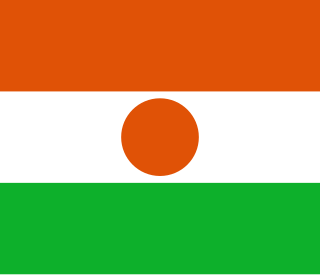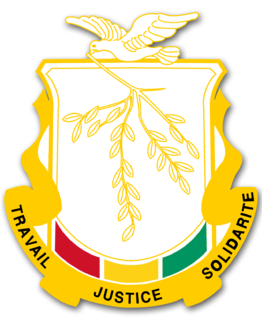
This is the history of Niger. See also the history of Africa and the history of West Africa.
The Rassemblement Démocratique Africain, commonly known as the RDA and variously translated as African Democratic Assembly and African Democratic Rally, was a political party in French West Africa and French Equatorial Africa which was important in the decolonization of the French empire. The RDA was composed of different political parties throughout the French colonies in Africa and lasted from 1946 until 1958. At certain points, the RDA was the largest political party in the colonies in Africa and played a key role in the French government headed by the Democratic and Socialist Union of the Resistance (UDSR). Although the regional party largely dissolved in 1958 with the independence votes for the colonies, many of the national parties retained the RDA in their name and some continue to do so. The political ideology of the party did not endorse outright secession of colonies from France, but it was anti-colonial and pan-Africanist in its political stances.

Elections in Niger take place within the framework of a semi-presidential system. The President and National Assembly are elected by the public, with elections organised by the Independent National Electoral Commission (CENI).

Hamani Diori was the first President of the Republic of Niger. He was appointed to that office in 1960, when Niger gained independence. Although corruption was a common feature of his administration, he gained international respect for his role as a spokesman for African affairs and as a popular arbitrator in conflicts. His rule ended with a coup in 1974.
Adamou Assane Mayaki was a Nigerien politician and diplomat. Mayaki was the Foreign Minister of Niger from 1963–1965, and a leading member of the ruling PPN-RDA party.

The following outline is provided as an overview of and topical guide to Niger:

The Union of Popular Forces for Democracy and Progress-Sawaba is a political party in Niger, founded as the Nigerien Democratic Union in 1954. The original party, founded by Nigerien Progressive Party (PPN) co-leader Djibo Bakary when he was expelled from the PPN. In the mid-1950s it created a broad coalition led by urban leftists but forged of conservative rural notables, especially from Hausa areas, which dominated the nascent Nigerien independence movement. In this period it was renamed Mouvement Socialiste Africain-Sawaba, and then simply Sawaba. In pushing for complete independence from France in a 1958 referendum, the party fractured. At independence in 1960 it found itself in opposition and outlawed by Niger's first president, Hamani Diori. From exile, the party attempted an abortive guerrilla campaign in the mid-1960s, and then largely disappeared. Its leadership returned to Niger following the 1974 military coup, but soon found themselves arrested, in exile, or marginalised. Following the return of democracy in 1991, the now elderly Bakary re-founded the party as UDFP-Sawaba. In the 1993 elections it took only a small numbers of votes. Within the year the party had split, with a new faction (UDFR-Sawaba) joining the government coalition. Despite Bakary's death in 1998 and their continued electoral underachievement, both parties holding the Sawaba name continue.

The Alliance of the Forces of Change was one of the two large political coalitions which contested for power in Niger from 1991 to 1996.
The 1974 Nigerien coup d'état was a largely bloodless military insurrection which overthrew the first postcolonial government of Niger. The government that followed, while plagued by coup attempts of its own, survived until 1991.
Mamadou Maidah (1924–2005) was a Nigerien politician and diplomat. Mamadou was the Foreign Minister of Niger from 1963 to 1965, and a leading member of the ruling PPN-RDA party.

Territorial Assembly elections were held in Niger on 14 December 1958. The result was a victory for the Union for the Franco-African Community, which won 49 of the 60 seats.

A constitutional referendum was held in Guinea on 28 September 1958 as part of a wider referendum across the French Union on whether to adopt the new French Constitution; if accepted, colonies would become part of the new French Community; if rejected, the territory would be granted independence.
Abdoulaye Hamani Diori was a Nigerien political leader and businessman. The son of Niger's first President, he waged a political and abortive military struggle against the Military regime that overthrew his father. With the return of democracy to Niger, Abdoulaye became head of his father's political party, and maintained a small but influential place in the political life of Niger until his death in 2011. Abdoulaye was married with four children. A Muslim, he earned the honorific 'Hadji' after making the pilgrimage to Mecca. He died 25 April 2011 at National Hospital in Niamey, aged 65, following an illness.

The Nigerien Action Bloc was a political party in Niger in 1955 and 1956 led by Issoufou Saïdou Djermakoye, a traditional chief and former chairman of the Nigerien Progressive Party (PPN).

The Nigerien Progressive Union was a political party in Niger led by Georges Condat.

Elections to the French National Assembly were held in Niger on 2 January 1956 as part of the wider French elections. The Nigerien Progressive Party (PPN) and the Nigerien Action Bloc−Nigerien Progressive Union (BNA−UPN) alliance won one seat each. Georges Condat took the BNA−UPN seat, whilst Hamani Diori took the PPN seat.

The Union of Nigerien Independents and Sympathisers was a political party in Niger.








